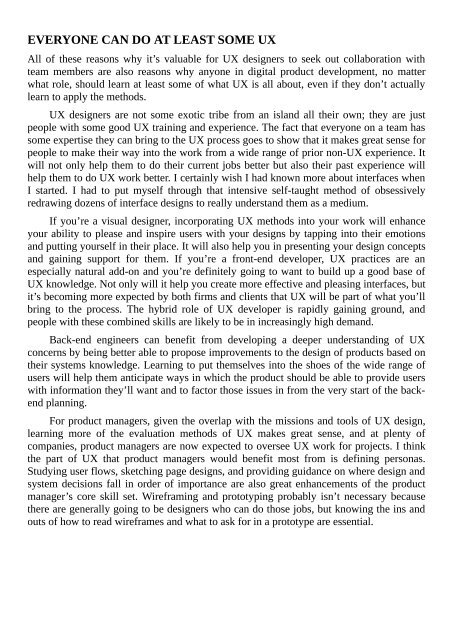Create successful ePaper yourself
Turn your PDF publications into a flip-book with our unique Google optimized e-Paper software.
EVERYONE CAN DO AT LEAST SOME UX<br />
All of these reasons why it’s valuable for UX designers to seek out collaboration with<br />
team members are also reasons why anyone in digital product development, no matter<br />
what role, should learn at least some of what UX is all about, even if they don’t actually<br />
learn to apply the methods.<br />
UX designers are not some exotic tribe from an island all their own; they are just<br />
people with some good UX training and experience. The fact that everyone on a team has<br />
some expertise they can bring to the UX process goes to show that it makes great sense for<br />
people to make their way into the work from a wide range of prior non-UX experience. It<br />
will not only help them to do their current jobs better but also their past experience will<br />
help them to do UX work better. I certainly wish I had known more about interfaces when<br />
I started. I had to put myself through that intensive self-taught method of obsessively<br />
redrawing dozens of interface designs to really understand them as a medium.<br />
If you’re a visual designer, incorporating UX methods into your work will enhance<br />
your ability to please and inspire users with your designs by tapping into their emotions<br />
and putting yourself in their place. It will also help you in presenting your design concepts<br />
and gaining support for them. If you’re a front-end developer, UX practices are an<br />
especially natural add-on and you’re definitely going to want to build up a good base of<br />
UX knowledge. Not only will it help you create more effective and pleasing interfaces, but<br />
it’s becoming more expected by both firms and clients that UX will be part of what you’ll<br />
bring to the process. The hybrid role of UX developer is rapidly gaining ground, and<br />
people with these combined skills are likely to be in increasingly high demand.<br />
Back-end engineers can benefit from developing a deeper understanding of UX<br />
concerns by being better able to propose improvements to the design of products based on<br />
their systems knowledge. Learning to put themselves into the shoes of the wide range of<br />
users will help them anticipate ways in which the product should be able to provide users<br />
with information they’ll want and to factor those issues in from the very start of the backend<br />
planning.<br />
For product managers, given the overlap with the missions and tools of UX design,<br />
learning more of the evaluation methods of UX makes great sense, and at plenty of<br />
companies, product managers are now expected to oversee UX work for projects. I think<br />
the part of UX that product managers would benefit most from is defining personas.<br />
Studying user flows, sketching page designs, and providing guidance on where design and<br />
system decisions fall in order of importance are also great enhancements of the product<br />
manager’s core skill set. Wireframing and prototyping probably isn’t necessary because<br />
there are generally going to be designers who can do those jobs, but knowing the ins and<br />
outs of how to read wireframes and what to ask for in a prototype are essential.


